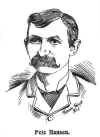woods; a bridge being washed away by a freshet, enabled them to completely surround him.
Morgan was surprised and captured and Jarvis was one of the foremost boys in the affray, and was one of the guards selected to prevent the release of Morgan by his friends.
For bravery in connection with the capture of Morgan he was given a lieutenant's commission in the 13 Ohio Calvary, but was soon promoted to a captaincy.
He was mustered out in 1865 as Major by brevet. He was married in June 1867 to Miss Ella Hutchinson, at Paxton, Illinois.
Mrs. Jarvis died of consumption Sept. 18, 1874, and was buried near their dugout on the homestead; she left three small children, Eddie, Della and Johnnie; after Mrs. Jarvis died Captain Jarvis' mother kept house for him.
He was appointed postmaster at Norton February 11, 1878 to succeed W. B. Rogers.
In the spring of 1878 he built the old postoffice building on the corner, afterward burned in the great fire of 1886.
He resigned the postoffice in the fall of 1878, on account of ill health. He removed his wife's remains to the Norton cemetery in October 1877.
He died of consumption Oct. 20, 1879 and is buried by the side of his wife. W. B. Jones was appointed guardian for the children.
Jarvis' only daughter, Della, died in 1882 of scarlet fever, and is buried by the side of her parents.
The two boys make their home with W. B. Jones in Portland, Oregon. The youngest boy, Johnnie is afflicted with scrofula and at last reports was nearly blind.
Capt. Jarvis took an active part in the organization of school district No. 1, and was its first director. At the time the bonds were voted in 1872 public sentiment was divided as to the propriety of building a $3000.00 school house, there being but one child of school age in the district, and she a young lady, viz: Miss Anna Jones, a sister of Mrs. Billings, and a half sister of Oliver and W. B. Jones.
The opponents to the bonds were led by Sol Marsh and Henry Oliver. Jones would argue that a big school house would attract immigration, etc. After the bonds were voted and sold and no school house built, Jarvis very much chagrined at the action of his supposed friends, was very much humiliated to think that his plans failed; however, no blame was ever attached to him in regard to the matter as every one considered that his part in the transaction was inspired by honest motives.
The G.A.R. boys of this city named their post in honor of him. The only mark that designated the last resting place of him or his family is a marble slab furnished by a grateful government to its illustrious dead.
 Peter Hansen settled in this county early in 1862; he took an active part in the
organization of the county and was for some years county commissioner. He has lived since 1875 at Logan; he is now on a year's visit to his birth place in Sweden. We can't write his full biography at this time for lack of date; he will be referred to again.
Peter Hansen settled in this county early in 1862; he took an active part in the
organization of the county and was for some years county commissioner. He has lived since 1875 at Logan; he is now on a year's visit to his birth place in Sweden. We can't write his full biography at this time for lack of date; he will be referred to again.
In February 1872, N. H. Billings came here from Cloud county; he at once commenced to make preparation to start a town and organize the county.
He represented to Coleman and Jim Hall, the only settlers here at that time, to be at the head of a syndicate of capitalists who would spend their money liberally in building a city.
Billings was a man of over weaning vanity and succeeded in convincing them he was their Moses.
In a historical sketch written by J. H. Simmons and published in the Norton County Bee (published by A. F. Harmer at Norton) under date of March 12, 1877, he says of Billings: "About this time a long, lank specimen of the
|